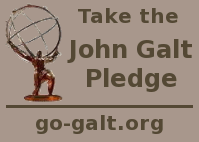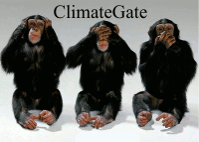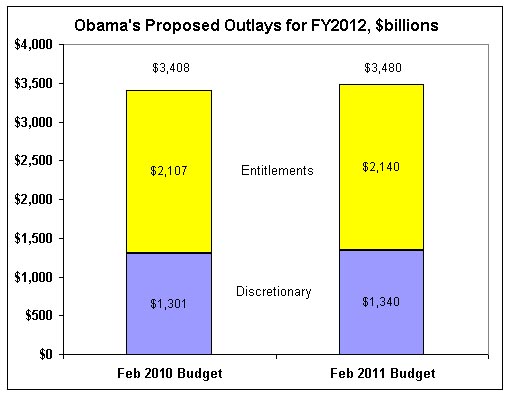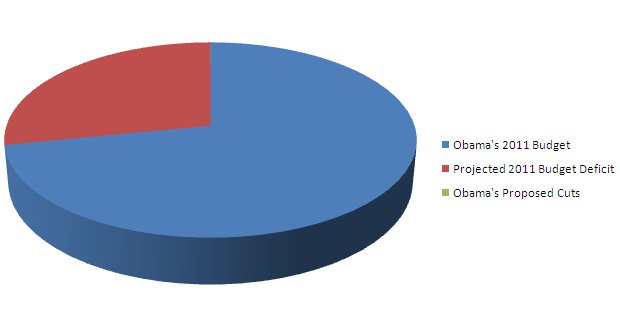06-02-2012

Permalink


Not So Fast, Bud!
|
Subject: Statism: Part I – The Growth of the Regulatory
State

Come gather 'round people, wherever you roam
And admit that the waters around you have grown
And accept it that soon you'll be drenched to the bone
If your time to you is worth savin'
Then you better start swimmin' or you'll sink like a stone
For the times they are a-changin'.
—
Bob Dylan

Well I doubt that when Dylan penned these lyrics back in 1963 he had
the same thought in mind as I, but yes, today the times certainly are
still a-changin'! More recently, our president had promised us
"Hope and Change," but hope for what sort of change exactly?
From the founding of the United States and through most of the 19th
century, with the very notable exception of slavery, Americans were
generally free to pursue their lives and interests without intervention
by the state. For example, according to
Wikipedia, "For most of Western history, marriage was a private
contract between two families" and licenses did not begin to be
required until after the Civil War. People were allowed to train for
and pursue their chosen work as they best saw fit, with very few
professions being
licensed.
Immigration was generally unrestricted and citizens were free to
acquire open land and improve it as their own property—a policy
codified into law with the
Homestead Act
of 1862. Taxes were generally low and consisted predominantly of
tariffs imposed upon imported goods. Although a temporary income tax
was levied during the Civil War, it was rescinded shortly thereafter.
And of course, slavery was eventually abolished.
This unprecedented level of freedom allowed the rise of self-made
businessmen such as
Rockefeller,
Carnegie,
Schwab,
Hill,
Vanderbilt,
Stanford,
Edison,
Ford,
and many others who transformed the industries of Oil, Steel,
Transportation, Finance, Energy, Textiles and Agriculture, and in the
process, dramatically increasing the average standard of living. In
America, between 1850-1910,
life expectancy rose 40%, from 38 to 53 years. And during
the period from 1820-1913, the GDP
per capita surged by 422% (in constant dollars), allowing the
US economy to grow to well over
twice the strength of any other country!
Despite these extraordinary results, starting in the latter part of
the 19th century and then accelerating in the 20th, the United States
began significantly tacking away from freedom and towards statism,
replacing the sovereign autonomy of the individual with the
collectivist notion of an all powerful authoritarian government
ruling over and controlling its citizens.
By statism, I mean:
|
Statism: [via dictionary.com]
1) the principle or policy of concentrating extensive economic,
political, and related controls in the state at the cost of
individual liberty.
|
The rise of statism in America has advanced in a series of spurts,
but the overall trend has been one of an expanding government asserting
control over an ever widening array of activities in which individuals
were once free to engage without intervention.
In this article, we will take a brief historical survey of the major
pieces of regulatory legislation that have been imposed upon the
American people, investigate some of the reasons for their adoption,
and then conclude with a review of the impact that all this has had on
the erosion of our liberty over the past 100 years.
Note: There are many links provided in this document which you may
follow when desired, in order to explore these issues in greater detail.

The Magical Mystery Tour is Coming to Take You Away
– The Beatles
It requires a bit of prestidigitation coupled with a great deal of
misdirection in order to get people to sit back and quietly accept
that their rights are being stripped away.
The majority of the 19th century was dominated by Classical
Liberalism, a philosophy grounded in the principles of
individual liberty and constitutionally-constrained government. And
it was understood that the idea of liberty extended fully into the
economic realm. Quoting from
Wikipedia:
|
Freedom was maximized when the government took a "hands off"
attitude toward industrial development and supported the value
of the currency by freely exchanging paper money for gold.
|
Unconstrained freedom is what allowed personal ambition to be
translated into advancement and success, and it produced the
spectacular results previously noted.
Yet, despite these achievements, there were those who feared liberty,
believing instead that society's problems could only be solved through
"modern", "efficient", "scientific", centralized government planning
and control. And thus was born
Progressivism. Consider the following two quotes. First,
from educator
George M. Forbes:
|
[W]e are now intensely occupied in forging the tools of
democracy, the direct primary, the initiative, the referendum,
the recall, the short ballot, commission government. But in
our enthusiasm we do not seem to be aware that these tools will
be worthless unless they are used by those who are aflame with
the sense of brotherhood...The idea [of the social centers
movement is] to establish in each community an institution
having a direct and vital relation to the welfare of the
neighborhood, ward, or district, and also to the city as a
whole.
|
And this from historian
William Leuchtenburg:
|
The Progressives believed in the Hamiltonian concept of
positive government, of a national government directing the
destinies of the nation at home and abroad. They had little
but contempt for the strict construction of the Constitution
by conservative judges, who would restrict the power of the
national government to act against social evils and to extend
the blessings of democracy to less favored lands. The real
enemy was particularism, state rights, limited government.
|
And there you have it—the rejection of both fundamental
pillars of classical liberalism.
As Forbes makes crystal clear, concern for the rights of the individual
are nowhere to be seen. What matters is the welfare of the
group—any group—whether it be the neighborhood,
ward, district, or city. It is communal brotherhood that is
the moral ideal, not self-directedness and personal responsibility.
And as Leuchtenburg informs us, the progressive has nothing but
contempt for the constitution and the idea of limited government.
The goal was to reverse the classical liberal model. Rather than a
world consisting of a constrained government and unconstrained
citizenry, they sought to establish an unconstrained, all-powerful
government which would then impose any manner of constraints upon
the subservient individual, all done in the name of social
justice.
What we have here is the reemergence of the age old battle between
individualism and collectivism.
Individualism holds that every person is an end in themselves,
possessing the inalienable right to their own life, which grants them
sole authority to set their purpose and direct the course of their
existence.
Collectivism, a species of statism, declares one or another group as
sovereign, with individual members then forced to submit to the group's
collective will. Each person's existence is contingent upon their
usefulness and service to the group.
By the early 20th century the battle was engaged as the collectivists
began to chip away at liberty. Unfortunately, 120 years after its
ratification, the general populace was no longer prepared to mount a
proper defense of the ideals of freedom guaranteed by the U.S.
Constitution.

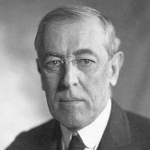
|

|
Beginning in 1913, the Woodrow
Wilson (1913-20) administration earned dubious distinction
for politically kicking off the progressive era through a series of
legislative acts which included:
|
- Enacting the sixteenth amendment to the U.S. Constitution,
permanently cementing in place the progressive Income Tax
and establishing, in law, that the product of your efforts now
belonged to society, not you.

- Instituting the Federal
Reserve System (FED) which effectively nationalized the
money supply and banking system.

- Creating the
Federal Trade Commission (FTC) to track and regulate
business and industry practices.

- Passing the Clayton
Antitrust Act to further curtail business independence
and freedom of action.

- Passing the Federal
Farm Loan Act, the precedent for the 2,238+ programs
currently listed in Catalog of Federal Domestic Assistance
[CFDA].

- Regulating the labor markets through passage of the Adamson
Act and the later-to-be-determined-unconstitutional,
Keating-Owen Act.

- Reinstituting the
military draft during World War I, making it
explicit that your life belonged to society, not you.

- In response to WWI, agricultural markets were regulated and
certain prices fixed through the creation of the U.S.
Food Administration. Subsequently, Wilson issued a
proclamation calling for the public to voluntarily observe
"wheatless Mondays and Wednesdays", "meatless Tuesdays" and
"porkless and sweetless Saturdays", while mandatory food
restrictions were imposed on the baking industry.

- Energy markets were also regulated through the creation of the
Federal
Fuel Administration, which took complete control over
coal, and to a lesser degree the oil and natural gas industries.
Here, the public was urged to observe "heatless Mondays",
"gasless Sundays" and "lightless nights". The government
determined what were classified as "nonessential factories",
which were then order closed.
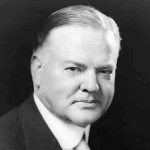
|

|
As
Hans Sennholz has reported, during the next fifteen years many
of these Wilsonian agencies and policies interfered with normal
self-correcting market mechanisms, while the manipulation of the
money supply under the aegis of the newly created FED, were
together
ultimately responsible for the massive credit expansion and
resulting stock market crash in 1929. Faced with a recession, the
Herbert
Hoover (1929-32) administration responded as follows:
|
- Increased the top personal tax bracket from 25% to 63%. Well,
it had already been made clear that the government did not
consider it to be your money.

- Increased corporate taxes. Same principle for businesses.

- Instituted the
Smoot-Hawley Tariff Act, raising tariffs on over
20,000 imported goods to near record levels and triggering
retaliatory tariffs from other countries.
The results? U.S. imports decreased by 66% and exports
decreased by 61% during the four years of the Hoover
administration.
During 1930, the economy had been showing signs of slow recovery.
However, each of Hoover's actions was like a shock to the economic
system, creating uncertainty, discouraging investment, and severely
disrupting international trade. Adding this on top of the Wilsonian
interventions which remained in place, and the result was to induce
a full fledged heart attack in the recovering patient, plunging the
U.S. into the throws of the Great Depression.
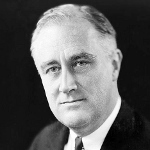
|

|
In 1933, happy
days were here again, with the election of Franklin D. Roosevelt
(FDR) (1933-45) to the presidency. Despite having campaigned on a
platform opposing Hoover's deficits, and calling for "drastic
reductions of all public expenditures", "abolishing useless
commissions and offices", and for a "sound currency",
immediately upon his inauguration he turned his back on his
promises and launched into his explicitly anti-capitalist New Deal programs,
saddling us with:
|
- The
Glass-Steagall Act which regulated financial
speculation (i.e., business risk-taking), while also
creating ...

- The
Federal Deposit Insurance Corporation (FDIC), which
nationalized future banking system failures while producing the
unintended consequence of training depositors to no longer
worry about or investigate the credit-worthiness of their
financial institutions.

- The
Securities and Exchange Commission (SEC), which began
regulating the stock exchanges and all other financial markets.

- The
Social Security Ponzi scheme,
and its FICA Payroll
Witholding Tax which hid from view the full impact of
the tax burden being born by the typical worker.

- An increased standard marginal tax rates, up to 91%—and
with
Executive Order 9250, the creation of a
100% marginal rate on salaries over $25,000.
Wake up folks, it's simply not your money!

- The
Thomas Amendment, which authorized currency
expansion (i.e., inflating the money supply) at the whim of
the president.

- Currency devaluation through
Executive Order 6102. Private ownership of gold was
declared illegal, and once confiscated from all citizens it
was then repriced from $20.67 to $35.00 an ounce—an
inflation of just under 70%—profiting government at
the expense of everyone else left holding significantly
devalued paper dollars.

- The creation of the
Internal Revenue Service (IRS), to enforce tax
compliance.

- The
Federal Housing Administration (FHA) and the
U.S. Housing Authority, which nationalized the
construction of low-cost public housing and provided mortgage
and insurance subsidies.

- The
National Industrial Recovery Act (NIRA), which
granted the president the power to regulate industry and
authorize monopolies as desired, bypassing the newly minted
anti-trust laws on a whim. NIRA is a poster child for the
method of handing off regulatory law-making from the
legislative to the administrative branch of government.
According to
Wikipedia:
|
NIRA, as implemented by the [National Recovery
Administration], became notorious for generating large
numbers of regulations. The agency approved 557 basic and
189 supplemental industry codes in two years. Between
4,000 and 5,000 business practices were prohibited, some
3,000 administrative orders running to over 10,000 pages
promulgated, and thousands of opinions and guides from
national, regional, and local code boards interpreted and
enforced the Act.
|
In 1935, the Supreme Court unanimously held the NIRA to be
unconstitutional.

- Despite his 1940 campaign promises to keep America out of
the war, Roosevelt reinstituted military conscription during
that same year—the first
peacetime draft in U.S. history. The
Selective Service System which mandated draft
registration was also recreated.

- The
National Labor Relations Act, granting the government
the power to regulate interactions between unions and employers,
imposing constraints on what actions would be permitted to
either group, and thereby extinguishing the right to freedom of
association.

- The
Fair Labor Standards Act, which regulated pay levels
and instituted the
Minimum Wage.

- The
Public Utility Holding Company Act of 1935 which
nationalized electric power generation. The federal government
forced divestiture of private energy holding companies and
regulated the industry, including pricing. The government also
went into electrical production with the acquisition of private
companies and the creation of public utilities, including the
Tennessee Valley Authority, then the largest
federally-owned corporation in America.

- Numerous government make-work programs through agencies such as
the
Federal Emergency Relief Administration (FERA),
Civilian Conservation Corps (CCC), and the
Works Progress Administration (WPA). At one point,
over three million civilian workers were being directly
subsidized, accounting for just under 7% of the entire
GDP—assuming of course that you are willing to classify
much of these agencies make-work programs as actual
domestic product!

- The
Reconstruction Finance Corporation, used to pick
winners and losers by making targeted loans to state and local
governments, banks, railroads, mortgage lenders and other
businesses.

- The
Agricultural Adjustment Administration, which taxed
producers of farm products and then paid subsidies directly to
farmers to kill their livestock and to not grow
crops on their land, forcing food prices up for everyone
else. Never will you find a clearer example of the
"fallacy
of the broken window!"

- The
Federal National Mortgage Association (Fannie Mae),
a government-sponsored enterprise (GSE) which securitized
mortgages in the secondary market with the intent of increasing
home ownership.
Does any of this sound familiar?
It is generally acknowledged that despite the New Deal's
Keynesian program
of massive tax increases, large-scale injection of funds into the
economy through deficit spending, and the replacement of free market
mechanisms with central planning, the overall impact on improving the
economic health of the country was minimal. By 1939, although federal
spending was then three times greater than it had been in 1929, private
sector unemployment remained above 17% (Lebergott)
and the GDP was still only 90% of what it had been a decade earlier.
Is this starting to ring a bell?
While each of the above programs constituted a massive expansion of
the federal government's intrusion into personal and business affairs,
the most significant shift in the relationship between citizen and
government was made explicit in FDR's 1941 State of the
Union address in which he outlined the four fundamental
freedoms (i.e., rights) that all people should be accorded:
- Freedom of speech and expression

- Freedom of worship

- Freedom from want

- Freedom from fear
While the first two items were merely a restatement of inherent rights
acknowledged by the First Amendment, the remaining items turned the
concept on its head. Whereas rights had previously pertained
exclusively to the arena of freedom of action in service of one's own
life, this declaration of a "freedom from want" and a
"freedom from fear" inverted the meaning of a right,
changing it into an entitlement—a guarantee of economic
and physical security that was not to be earned through one's own
efforts, but was owed to all, apparently as a simple matter of one's
existence. And who would be responsible for supplying these goods and
services? Well, somebody else!
Here we witness the philosophical birth of the full blown American
entitlement state. By 1944, FDR had expanded the principles into his
Second
Bill of Rights in which he called on Congress to guarantee:
- Full Employment

- A Living Wage

- A Market for One's Goods and Services

- Freedom from Unfair Competition

- Decent Housing

- Medical Care and Good Health

- Economic Protection from Accidents

- Retirement Security

- Quality Education
As each of these "entitlement rights" required a good or service
be provided to some at the expense of others, the net result was the
transformation of government from the role of equal protector of the
inherent rights of all, into an agent of forcible wealth transfer
from the productive members of society to the needy. What went
unacknowledged was the fact that the fulfillment of each "entitlement
right" required the erosion of the very rights of life, liberty and
property that the Constitution had empowered the government to protect.
In the span of a short 30 years (1913-1943), despite supposed
Constitutional protections, the fundamental nature of American
government had been completely reversed, and a once free and independent
populace had been transformed into classes of serfs and wards of the
omnipresent state. Any expectation of retaining and practicing one's
constitutionally guaranteed rights was now nothing more than a
fiction—a fading illusion.
After FDR's death, the Truman
administration made it its goal to cement in place the programs of
the New Deal by expanding public works projects, increasing subsidies
and entitlements, and further interfering into the affairs of business,
labor and employment.
Eisenhower and Kennedy
generally continued to support these policies throughout their
respective administrations.

|

|
Channeling the New Deal from thirty years earlier, Lyndon B. Johnson
(1963-68) instituted his Great
Society program, including his War on Poverty,
once again dramatically expanding the size and role of the federal
government while adding a new array of regulations and entitlements
through the creation of:
|
-
Medicare, medical entitlement for the aged.

-
Medicaid, medical entitlement for the indigent.

-
Social Security benefit increases and expanded
coverage for those in poverty.

-
Food Stamps, as part of the Supplemental
Nutrition Assistance Program (SNAP).

-
Vista, a domestic, federally-funded, community-based
volunteer program to aid the needy.

-
Job Corps, to provide vocational training for
low-income youth.

-
Community Action Agencies, which received government
grants in order to implement local welfare and subsidy programs.

-
Head Start,
Project Follow Through and
Upward Bound, all programs designed to provide
day-care, education, health and social services to low-income
children, from pre-school onward.

-
Federal Transit Administration, (Originally the
Urban Mass Transportation Authority), to fund bus,
subway, rail, ferry, trolley and other transportation projects.

-
National Highway Traffic Safety Administration
(NHTSA), to license automobile manufacturers, regulate road and
vehicle safety, set fuel economy standards and establish limits
on engine emissions.

-
Model Cities Program, a
disastrous federal urban renewal program. (For more
information on the negative impact of this and other urban
renewal programs, see my article here.)

-
National Endowment for the Arts (NEA) and
National Endowment for the Humanities (NEH),
expanding government into the critically important fields of
literature, poetry, painting, sculpture, photography, music,
dance, and so much more!

-
Corporation for Public Broadcasting, the funding
organization for
PBS and
NPR.
Involvement in supporting specific news and programming outlets
placed the government squarely in the propaganda business.

-
Fair Packaging and Labeling Act, regulating the
information to be placed on product packaging.

- The selective service and military draft remained active after
WWII, and during Johnson's escalation of the Vietnamese War,
the
number of American troops stationed in Vietnam
increased from 16,300 in 1963 to 536,100 by 1968.

- The
Revenue and Expenditure Control Act of 1968, which
imposed a temporary 10% surcharge on personal and corporate
income taxes (later extended through 1970) to partially cover
the cost of the war.
By 1969, along with the cost of the Vietnam War, all of the new federal
spending required by the War on Poverty produced an inflation
rate of 4.7% and resulted in spiraling deficit spending that rose 525%
during Johnson's six year term, increasing the national debt by over
16%. Interest rates had also increased to their highest level in a
century.
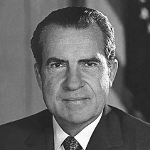
|

|
Being a Republican, one might expect Richard
Nixon (1969-74) to stand up for free-market principles.
One would be wrong. In addition to his well known ethical
failings, during his tenure he managed to commit the following
acts:
|
As any Austrian economist
would have predicted, the combination of Johnson's excessive spending
spree, coupled with Nixon's counterproductive actions, resulted in a
severe recession that lasted through the Ford and Carter
administrations. Other cyclical recessions were to follow as a
consequence of maintaining these and other government interventions
in the market.
The period during the Ford (1974-76),
Carter
(1977-80), Reagan
(1981-88),
Bush Sr. (1989-92), Clinton
(1993-2000) and Bush Jr.
(2001-08) administrations was mixed. There were various instances
of deregulation and periodic tax reductions, later followed by tax
increases and new legislation. The scope of federal social and
economic regulations seesawed up and down, but on average, continued to
steadily increase. For example, during this period the country was
treated to the following:
- Creation of the
Department of Energy (DOE), which established a
federally mandated energy conservation policy for the entire
country, backed up by a new regulatory bureaucracy. (Carter)

- The establishment of the
Department of Education, which began the process
of centralizing the administration of education policies across
the nation. (Carter)

- The
Job Training Partnership Act, which significantly
expanded training subsidies for youth and unskilled adults.
(Reagan)

- The
Americans with Disabilities Act (ADA), which imposed
a complex new set of rules affecting employment, transportation,
telecommunications, and all publically accessible existing and
new construction, enforced through public lawsuits. (Bush Sr.)

- The
Children's Health Insurance Program (CHIP), which
extended health coverage to the children of families that
had incomes too high to qualify for Medicaid. (Clinton)

- The No
Child Left Behind Act, which imposed significant new
education standards on state schools as a contingency for
receiving federal funds. (Bush Jr.)

-
Faith-Based Initiatives: Legislation designed to
make it easier to transfer increased federal funds to
religious organizations. (Bush Jr.)

- The
Medicare Prescription Drug, Improvement, and Modernization
Act, an overhaul to Medicare which provided new
prescription drug entitlements to seniors, at a projected
cost of an additional $549 billion over a ten year
period. (Bush Jr.)

- The initial $700 billion Troubles Asset Relief
Program (TARP), used to directly bailout various
financial institutions while nationalizing the financial and
automotive sectors through the purchase of shares in AIG,
Citigroup, General Motors, Chrysler, and other companies.
(Bush Jr.)
As a measure of the growth of government over this period, the federal
debt rose from $484 billion in 1974 to $10 trillion by
2008—a 20x increase. As a percentage of GDP, the debt
went from 33.6% to 69.7%, an increase of over 100%.
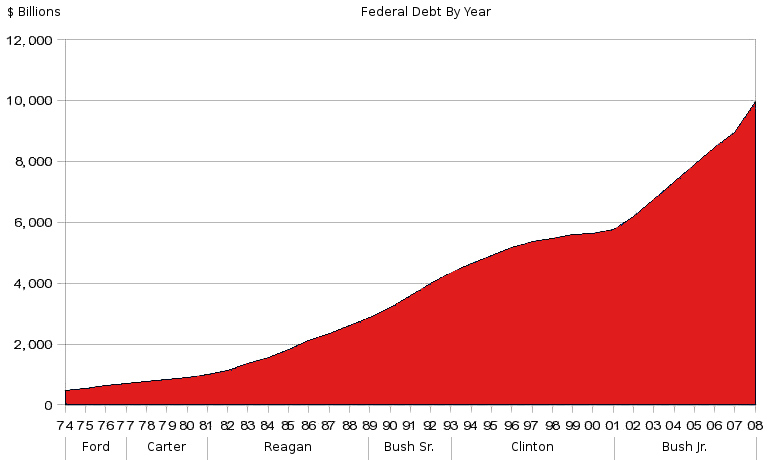
(Click on image for larger view)
Another measure of the growth in annual new regulations can be gauged
by the size of the Federal Register, which almost doubled from
45,422 pages in 1974 to 80,700 pages by 2008. And
remember, this is the annual regulatory output. During the
Bush Jr. years alone, there were 614,293 new pages of
regulations issued. So much for the complaint about deregulation
during that administration!
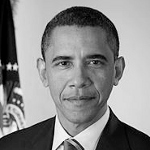
|

|
All of which brings us to Barack Obama
(2009-12). In less than one term the current administration has
disregarded the Constitution, invalidated the rule of law, and been
responsible for one of the greatest increases in the size and scope
of the regulatory state through a series of acts, including:
|
- Record Deficits: During the period from 2009 through
2012 (est.), the total deficit spending will be greater than
$5.3 trillion, increasing the federal debt to more than
$16.3 trillion, which represents over $52,100 of
debt for every man, woman and child in the U.S, or more
realistically, $208,400 for a typical household of four.
The total debt is equal to 105% of GDP, as compared to
the
debt-to-GDP ratios of: Spain: 69%, Ireland: 104%,
Portugal: 107%, Italy: 120%, Greece: 161%—good company,
one and all!
Of course, the above figures are made possible through the use
of government accounting practices that would put any private
citizen behind bars were they to use them. According to this
USA Today story, where the federal government reports a
deficit of $1.3 trillion for the previous year, standard
accounting practices would properly show that figure to be
$5 trillion! That is an underreporting by 260%.
Today, in order to cover the total cost of all federal
liabilities, each American household is now on the hook for
over $561,000. Good luck with that!
- The nationalization of the medical and insurance industries
through the
Patient Protection and Affordable Care Act
(i.e., Obamacare), a 2,409 page bill rammed, substantially
unread ("we have to pass the bill so you can find out what
is in it", Pelosi), through Congress using the budgetary
trick of
reconciliation. It is now conceded by its supporters
that rather than reduce medical costs, it will
increase
the average insurance premium by 20-30% by 2016. And
like every other bureaucratized social medical scheme ever
tried, it will produce untold inefficiencies and inevitably
lead to
health care rationing by impersonal panels of government
administrators more concerned with cost than care. The
constitutionality of the act, including its mandate to
purchase insurance, is currently under review by the Supreme
Court.
- The
American Recovery and Reinvestment Act (ARRA), an
additional $831 billion in Keynesian economic
"stimulus", over and above the previous $700 billion in TARP
funds ($1.53 trillion total), with the primary purpose
of creating jobs. The administration
indicated that unemployment was expected to rise to 9%, but
that with this stimulus it would remain under 8% and fall to
less than 6% by mid-2012. Instead, despite the massive
spending, unemployment increased to 10.1% (Oct. 2009) and
remains at well above 8% today. Based upon the Congressional
Budget Office's own figures, the average cost of each job created was between
$228,056 and $631,538, although
one report puts the figure as high as $4.1 million!
Your mortgaged future at work—or more accurately,
not at work!
- The
Dodd–Frank Wall Street Reform and Consumer Protection
Act, which imposed massive new regulatory requirements
on an already heavily regulated financial services industry.
This included creation of the:

-
Financial Stability Oversight Council which
determines what constitutes "excessive risk" and then
imposes it's edicts on financial institutions in order to
promote "market discipline".

-
Federal Insurance Office to identify "gaps
in the regulation of insurers" in order to "develop
Federal policy on prudential aspects of international
insurance matters".

-
Consumer Financial Protection Bureau which
regulates mortgages, credit cards, student loans, and other
financial products offered to consumers.

With the government dictating much of the day-to-day operating
parameters and reporting requirements for everything from
banks to hedge funds to debt collectors, the freedom to react
to market forces and innovate is significantly curtailed. As
John Allison has commented:
|
Dodd-Frank is a dramatic move toward statism as government
bureaucrats can practically decide which industries,
companies and consumers have available credit. Dodd-Frank
encourages more consolidation in the banking industry and
instead of eliminating "too big to fail," makes this
practice a permanent public policy.
|
- Expanding the size and powers of the
Internal Revenue Service (IRS) by tasking it
with the administration of the health care insurance mandate.
Obama requested a budged increase of roughly
$1 billion in order to hire thousands of additional
agents.
- The
Health Care and Education Reconciliation Act, part
of which fully nationalized the federally-insured student loan
industry, curtailing competition and restricting student
options while further driving up the
cost of higher education.
- The nationalization of the financial industry through the
Public-Private Investment Program for Legacy Assets,
intended to purchase "toxic assets" from failing
financial institutions, thereby moving liability from the
private sector onto the backs of American taxpayers.
- The nationalization of the automotive industry through
the government's acquisition of a
majority stake in General Motors and Chrysler.
After the takeover, the Obama administration then exerted fiat
dictatorial control over these organisations,
replacing the CEO at GM,
invalidating contract law by simply tossing existing
bondholders under the bus, awarding the UAW with an
unlawful 40% stake in the restructured company, and
selling off Chrysler to the Italian company, Fiat
SpA. The Wall Street Journal indicates that there has been a
$28.8 billion taxpayer loss on the GM and Chrysler
bailouts.
- The
Car Allowance Rebate System (Cash for Clunkers),
a $3 billion boondoggle where taxpayers were forced
to subsidize new car purchases for reasonably wealthy Americans
(those who could afford to purchase a new car) if they would
trade in their older, less fuel efficient vehicles which were
subsequently crushed! The net result was that: 1) total costs
exceeded total benefits by $1.4 billion, 2) average fuel
economy for all purchased vehicles increased by only 0.6 to
0.7 MPG, and 3) the destruction of all the trade-in vehicles
caused a reduction in supply and corresponding price increases
in the used car market, seriously harming low-income drivers.
- A
$7,500 taxpayer subsidy (read wealth transfer
payment) for the purchase of each plug-in electric vehicle.
In addition, there are huge subsidies for the installation of
electric charging stations for these vehicles.
- Despite a failing economy, continuing to push the discredited
Global Warming (i.e., Climate Change) agenda to the
tune of $70 billion, and investing public funds in failed
"green" initiatives such as the following examples:
Solyndra ($535 million loss and bankruptcy),
Evergreen Solar ($5.3 million federal, $50 million
state loss and bankruptcy),
SpectraWatt ($500,000 loss and bankruptcy),
Mountain Plaza Inc. ($424,000 loss and bankruptcy),
Fisker Automotive ($193 million loss, on verge of
bankruptcy),
Tesla Motors ($465 million loan, posting losses and
falling sales), and many others.
- Extending the regulatory powers of the
Food and Drug Administration (FDA), to impose new
user fees on drug and medical device makers, while
expanding the agency's power to control raw materials used in
manufacturing.
- Extending
unemployment benefits multiple times up to a total
of 99 weeks.
- The enactment of
21 new or increased taxes, many embedded within the
health care legislation. In addition, President ("I do
think at a certain point you've made enough money") Obama
has called for increased marginal tax rates and minimum
payments (Buffett Rule)
on the wealthy.
- Despite rising oil prices, by edict, Obama suspended new oil
exploration and drilling, including the
Gulf of Mexico, the
Arctic Ocean, and along the
Atlantic Coast. He blocked construction of the
Keystone XL Pipeline and imposed federal regulation
of the development of
Natural Gas resources, and the process of
Fracking. Consequently, automotive gasoline prices
have more than doubled during his administration, increasing
from
$1.84/gal.
(01-26-09) to
$3.79/gal.
(05-07-12).
- In keeping with his campaign promise that his energy policies
would ensure that "electricity
rates would necessarily skyrocket", mission
accomplished. Recent reports
reveal massive increases in utilities—850% in some
markets—in less than three years.
- Legislating through regulatory department fiat and executive
order:

Well, Obama did tell us that it was his plan to fundamentally
transform the United States of America!
And during his inaugural address, when he spoke of America being
"bigger than
the sum of our individual ambitions", he made it clear
where, in his view, the individual stands in relation to the collective
state.

What A Long Strange Trip It's Been.
– Jerry Garcia
What we observe from the above is a century of steadily expanding
government, inserting its tentacles into every crevice of our
existence and eroding the control we onced possessed to set the
course and then proceed with our lives, unimpeded.
Your Education:
Freedom of choice in the realm of education first went out the
window in America when the Massachusetts Bay Colony made it
compulsory back in 1642. However, after the
Revolutionary War, it wasn't until 1849 when Connecticut became the
first state to reintroduce mandatory school
attendance—something that is nationwide today,
notwithstanding the 13th Amendment's prohibition against involuntary
servitude.
Despite constant calls for increased funding and new initiatives,
government education is a massive failure.
A study by the Broad
Foundation shows that the value of public schooling is
perceived to be so low that 1.2 million students drop out each
year. The study also indicates that 70% of 8th grader are unable
to read proficiently, and that out of the top 30 industrialized
nations, American students rank 21st in science and 25th in math.
This despite many
reports showing that government expenditures per student
greatly exceeds those of private schools, while producing inferior
results.
Rather than address any of these facts pertaining to the abysmal
results in the traditional subject areas of reading, composition,
history, math, science and logic, the Obama administration has
instead made a huge investment in the implementation of
Service Learning—now active in roughly half of all
government school. This new program requires that all students
engage in mandatory community service work for a
specified number of hours each year in order to be allowed to
advance to the next grade. What types of work? Here are some
examples:
- Preparing and serving meals to homeless
- Working in shelters
- Clothing/food/book/toy drives
- Participating in community clean-up projects
- Supervising toddler recreation time
- Campaigning for a political candidate
[Emphasis added]
The time required for these activities can accrue to 200 hours
or more (depending upon the school) of enforced labor in order
for a student to be allowed to graduate. The idea is to
indoctrinate the school children into a view of
Service As A Social Norm. This is nothing less than a
back-door effort in support of the administration's larger goal
of instituting a mandatory program of universal
National
Service for all Americans, where up to two years of your
life are taken over by government masters.
As the above facts make clear, quality education of youth is not
the primary goal of our government-run school system. Were that
the case, then changes of a completely different nature would be
instituted, allowing market-based competition among private
schools, with parents able to to freely determine how to best spend
their dollars in order to successfully train their children.
Instead, what the evidence shows is that government seeks to
control the educational system as a means of being able to
indoctrinate one generation after another in its propaganda.
Whether it is forcing very young children to parrot praise for
our glorious supreme leader, creating an
eco-Nazi police force, asking students to
report family secrets, or being fed either the
progressive viewpoint on
diversity,
climate change, and
social justice, or the evangelical viewpoint on
creationism,
intelligent design, and
abstinence-only sex education, the end goal is the
creation of a culture of uniform, pliable minds that can be more
easily mobilized into service by a centralized
authority—something I previously discussed in my article
Building
Obama's Army.
Your Career:
Once upon a time it was you who decided whether you had
a skill of value to offer, and it was others who decided
whether they agreed and were willing to trade with you for your
services. But today, that's pretty much a fairy tale. Slowly,
the various states began to arbitrarily declare that one profession
after another was no longer yours to practice by right, but
only by privilege. They started with the licensing of the medical,
legal and teaching professions, and by 1920 had expanded into
architecture, engineering, accounting, insurance, pharmacy, real
estate, the building trades and even hair cutting. And
although the common fiction was that these professions were being
regulated in order to protect the public "health, safety and
welfare", the truth was that in almost every case the
restrictions were the result of heavy lobbying by business and
trade associations for the express purpose of creating barriers to entry
in the profession that would restrict competition and raise prices
for its existing members. The onerous licensing requirement
significantly increased the educational time and
expense—including costly examination fees that can run into
the thousands of dollars for certain professions—thereby
excluding many qualified people from an otherwise viable career
path. One unintended consequence of this was to actually lower
rather than raise the overall level of professionalism.
While the politicians may not themselves have been initially
interested in the true intent of professional licensing, they soon
came to see two major benefits. First, there were the ongoing
annual licensing fees that could be imposed upon an ever expanding
segment of the population—and new sources of taxes are always
a top priority. But more importantly, the politicians quickly
realized that with the power to extend the right to work within a
profession, also came the power to revoke that
privilege. This placed the state in the position of being able to
directly control the very livelihood of citizens—a new and
powerful lever that could be used to exact compliance from an
important segment of the voting public. With these incentives
awaiting, the gold rush was on, and the number of licenses
exploded. Today, pest control operator, locksmith, animal trainer,
travel guide, log scaler and shampooer are among the more than
1,100
distinct professions requiring a license in one or more
states. Here is a site listing 10,385
licensed occupations among the 50 states, while this link
provides a comprehensive list of 194
occupations requiring a license in the state of North
Carolina alone. During the 1950s, only 5% of American workers were
licensed. By 2008 that number had grown to 23% of the
workforce and is certainly higher today.
Your Business:
As our little stroll down memory lane has shown, the 20th and
21st century attack on free-market business practices has been an
unrelenting one. Every new regulation has created a government
bureaucracy that has hobbled entrepreneurs' ability to respond
to ever changing market forces, while burying them under a
mountain of record keeping and reporting that diverts crucial
resources away from productive activity.
In 2010 and 2011, the size of the Federal Register exceeded
82,000 pages—each year! This provides some
indication of the magnitude of the legislative burden being placed
upon business. And as the Wall Street Journal reported, in 2008,
the annual cost of complying with all federal regulations was
greater than
$1.75 trillion!
Consider how many jobs are being destroyed by this direct
government intervention. In 2010, the average national wage was
$41,600.
If we assume a generous 75% markup to cover non-salary expenses,
this raises the business cost per employee to $72,800. If that
$1.75 trillion were not being diverted to unproductive tasks, it
could represent more than 24 million potential jobs, while
the current unemployment rate is estimated to be 12.5 million!
That same WSJ article indicates that the cost of these regulations
is born disproportionately by smaller businesses:
|
As a consequence, small businesses—those with fewer
than 20 employees—incur regulatory costs 42% greater
than firms with between 20 and 499 employees, and 36%
greater than firms with more than 500 employees. The
regulatory cost per employee for small businesses was
$10,585, compared to $7,454 for medium firms and $7,755
for large firms.
|
Since small business is the center for new job creation, if Obama
were truly serious about increasing employment, then he should
actively work to reduce the regulatory burden on all enterprise.
Instead, his approach is exactly the opposite, so it's no mystery
why economic recovery has not occurred.
But the question still remains, if this level of misery is the
result, then why are progressives so committed to impeding the
golden goose that is business? And the simple answer is their
fear of freedom. The mere idea of an unregulated business left
to operate under its own direction is, in itself, so abhorrent,
that they are more willing to suffer the consequential pain of
applying the fetters.
Your Choices:
Telling us that monopolies were bad, the government created
antitrust legislation which it has then used to prosecute honest
businesses from Standard Oil
and Alcoa to IBM, Microsoft and
Google.
Of course, it is only bad when it is anyone other than the
politicians doing the monopolizing.
The U.S.
Postal Service is a "good" monopoly, because .... well,
because the government says it is. Between 2006–2011 the
Post Office lost over
$25 billion and is scheduled to lose another $14
billion during 2012. Despite these facts, profitable private
companies such as DHL, FedEx and UPS
are still prohibited from offering us their services in this area
of standard mail delivery.
Gambling is bad for you—unless it is the government that is
raking in the proceeds, at which point it is actively encouraged.
State governments maintain a monopoly on
lotteries and spend millions each year advertising them
with the intent of extracting billions of additional dollars
(
$53.8 billion in 2006) from their residents. Go ahead
and purchase your government tickets. Just don't you try
this at home! When it comes to government, what's good for me is
prohibited for thee.
Where individuals once dealt directly with businesses vying with
one another to provide us with various goods and services, over
time the politicians stepped in and created government-sponsored
monopolies that eliminating all competition. An early example was
the building of roads, followed later by the control or outright
takeover of one utility after another. The net result? Not happy
with your electric rates, your trash collection or your cable
service and would like to look elsewhere for something better?
Well tough noogies. You options have been eliminated because
there's now only one government-mandated game in town. Your right
to choose has been replaced by expanded controls which force you
to accept someone elses decisions. And despite the example of
AT&T,
where the end of the government-enforced monopoly led to rapid
innovation, increased consumer choice and dramatically lower
prices in the telecommunications industry, there is no will to
repeat that success.
Your Property:
"Government is instituted to protect property of every
sort; as well that which lies in the various rights of
individuals, as that which the term particularly expresses.
This being the end of government, that alone is a
just government, which impartially secures
to every man, whatever is his own."
—
James Madison
[Emphasis by Madison]
|
A free people have the right to dispose of their property as they
see fit. While this was generally true in the 19th and early 20th
century, it is no longer the case.
When it comes to your land, you are now regulated by zoning boards
which limit not only what type of structures you will be allowed to
build, but their placement, lot coverage, height, shape,
permeability, construction materials, signage, lighting,
landscaping, and often even the allowable colors will be dictated.
For some projects, you may also be required to make "social
concessions" such as paying for public amenities, turning over
a portion of your land as a park, or building a certain number of
subsidized units, in exchange (i.e., as a bribe) for obtaining
zoning approval. Then there are the building
inspectors, backed by many thousands of pages of codes and
regulations, who will demand you make detailed submissions for their
review, outlining every change or improvement intended for your
property. This submission must typically be accompanied by a very
large fee (tax) before the review will be conducted. The
Fire
Marshall or Army
Corps of Engineers may also weigh in, along with many
others officiating bodies, depending upon the nature of your
project. Should you meet all of the requirement and finally
receive building approval, then the inspectors will supervise all
work to insure that you perform to their requirements. The concept
of private property no longer exists. Government has asserted
authority over all usage, and while you bear the financial
liability for the construction and maintenance, you are really only
a tenant of the land. And each year you will receive a property tax
bill from the real owners to remind you of your leasehold
status.
Or consider another example. Do farmers have a right to the use
of their own cattle? Wisconsin Circuit Court Judge Patrick J.
Fiedler emphatically declared that they do not!
In a case where the judge proclaimed that the farm families
"do not have a fundamental right to consume the milk from their
own cow," he went even further, stating that Americans
"do not have a fundamental right to produce and consume the
foods of their choice."
Then there are federal asset seizures which have risen over
the years to epidemic proportions. This is where regulatory and
enforcement agencies are given the power to confiscate property
without
Fifth Amendment protection of due process. As the
Wall Street Journal reports, in 2010 alone:
"forfeiture programs confiscated homes, cars, boats and
cash in more than 15,000 cases. The total take topped $2.5
billion"
In the meantime, innocent people are being caught in this
unrestrained fishing net. Ostensibly, these seizures of ill-gotten
goods are supposed to be returned to victims, but a 1984 federal
law allows state and local agencies to retain up to 80% of
what is taken, creating what Scott Bullock of the Institute for
Justice points out is an "improper profit incentive."
So much for your property rights.
Your Income:
Your income is the product of your thought and labor. In a
free society it should be recognized as your property by right,
to save, invest, spend or give away as you—and only
you—wish. But this is not the view of contemporary
government. They see your earnings as their property, to
be disposed of in a manner of their choosing. By their grace,
politicians leave you with a percentage of what you make, but then
confiscate the remainder to fund their programs, schemes, junkets
and wars. We have already examined the case where FDR imposed a
100% marginal tax rate on income above a certain level, stating in
unequivocal terms that should anyone in that position choose to
work, they were fully slaves of the state. The following two
recent events reinforce this point:
In April, Barbara Boxer (D-CA) introduced Senate bill
S.1813 reauthorizing federal highway funding. But
hidden within that bill was a provision to revoke the passport of
anyone owing more than $50,000 to the IRS. By restricting citizens
from leaving the country, this would effectively erect a virtual
"Berlin Wall" around America, caging its citizens, who may
only depart if and when granted permission.
Then, in May, in response to Facebook co-founder Eduardo Saverin's
decision to renounce his citizenship and reside in Singapore,
Senators Chuck Schumer (D-NY) and Bob Casey (D-PA) proposed the
Ex-PATRIOT Act (S.
3205), which would impose a 30% tax on the investments of
any person renouncing their American citizenship. In addition,
these people would be barred from reentering the U.S., permanently
walling them out.
The vitriol
exhibited by both Schumer and Casey made crystal clear their
belief that Saverin was "stealing" from both them and the
U.S. government the millions of tax dollars to which they had a
rightful claim but would now be denied, due to Saverin's actions.
Some might argue that the typical progressive is motivated by their
radical
egalitarianism to work for equality among all people.
Not the "equality under the law" that the Founding Fathers
recognized, but "equality of outcomes" that promotes
uniformity across the entire social spectrum. However, this view
crumbles under close examination. Given a choice of proposals,
where one promotes that the less well off apply themselves and
raise their standard of living towards a more equal stature,
while another relies upon the confiscation of property and the
restraining of ability of those better off so as to bring them
down, the progressive will inevitably select the latter. They do
so because it is not empathy and love for the less fortunate that
motivates them, but envy and hatred for their betters that fuels
their passion. Refer to the actions of Boxer, Schumer and Casey
for a case in point.
Your Purchases:
Once the government had exacted its pound of flesh through taxes,
it would be nice if you were then left to spend the remainder of
your earnings as you liked. But no, the politicians are not
through with you just yet. They have an opinion as to just how
you should use that money. They know what's best for you.
For example, they think it would be great if you owned a house
instead of renting. And it would be swell if you would donate
some of your income to charities rather than spend it on yourself.
Of course, they have a vested interest in seeing you improve your
job skills, since they get more tax revenue as your pay-level
increases. So they nudge you in their direction by offering
tax
deductions for these and other desirable activities.
Or maybe these benevolent fairy god mothers who watch over us all
have decided that our behavior should conform to their more
"socially desirable" ideals. For example, maybe they would
like to see you be more environmentally conscious by
weatherizing your home or purchasing an
electric car. They accomplish these objectives by
taking money from someone else and offering it to you as a bribe.
An when it looks like gentle economic persuasion may not be
sufficient to accomplish their goals, then they invent a new trick
and simply tell you that you will be forced to
make a certain purchase as in the case of the
Obamacare health insurance mandate.
Your Family:
For centuries two people freely decided to marry and then did so.
But at some point the government simply asserted that individuals
no longer possessed that right and would henceforth be required to
seek permission from the state, with the state determining exactly
who may or may not wed, and under what conditions. Of course there
was also the matter of the ever present fee (i.e., tax).
And was the imposition of the marriage
license done to better secure the union? No. Its purpose
was to
prevent interracial marriages, just as today it remains
a tool to control or prevent same-sex marriages. The marriage
license is nothing more than one more instrument used to control
personal behavior and restrict choice.
Your Personal Life:
OK, that's a lot of control, but certainly in other areas of our
life we're still free to do as we like. Right?
I can drive wherever I desire.
Well, you had better
buckle up!

Then I'll take my bike for a spin.
Just don't forget to wear your
helmet.

Can I use a plastic bag?
Fat chance.

Then I'll use paper instead.
You'd better hurry. I said HURRY!

Certainly no one could stop me from giving you a
hug.
Are you so sure about that?

Hold on while I pack my child's lunch. Of course, she
may
never get to eat it.

Then I'll take my kid out to eat. You options may be
more limited than you thought.

I'm thirsty. Let's stop and get a soda. Did you get
permission from Mayor Bloomberg?

On the way home I'll get some milk from the local dairy.
Sorry,
they've been shut down.

Hmmm, can I have a king-sized candy bar?
Those are not the bars you're looking for.

I need to replace my burned out lightbulb. Not if you
want an
incandescent bulb!

At least the 2nd Amendment guarantees my right to bear
arms.
Not so much.

Can I still smoke? Sure if you have
$15/pack to spare and
stand right over here ... today!

I wasn't talking about cigarettes.
In that case, then you can
just forget it!

Well, at least I can still use salt on my food.
Nope.

You're kidding, right?
Nope.

Well, no one can make me recycle!
You sure are a funny kid, Johnny,
but I like you!
Is there anything at all that I can
still do on my own?
Now, that is a very good question!
Channeling Marvin Gaye, today's politicians would say:
There ain't no mountain high enough
Ain't no valley low enough
Ain't no behavior small enough
To keep me from regulating you
So, what's the point?
The point of this historical overview is to expose what is normally
hidden from view. The corrosion of our rights has been occurring
for decades. Each generation has faced its own smaller set of
issues, and at each juncture a tiny percentage of the populace has
fought back against the intrusions, with a few battles being won
and many more lost. Then society as a whole settles back into
abject complacency and learns to accept the new shackles that have
been imposed upon it ... at which point the process is ready to
repeat, ratcheting yet another notch closer to total enslavement.
The point is to take in the larger picture as a whole and to be
horrified by the sight!
For every abridgement of freedom proposed throughout human history,
there are an untold number of rationalizations that have been
offered up to justify its necessity. At one point a little finesse
was required in order to convince people to accept being reamed
with the sharp end of the stick, but after a century's worth of
abuse—not to mention indoctrination through government
schools—the best that today's leader could muster was:
"I had to abandon free market principles in order to
save the free market system." – Bush Jr.
and apparently that was good enough for most!
But the rationalizations simply don't cut it. When you add
everything up, it soon becomes clear that our liberty has not
been cashed in to save our country. It was not used as a down
payment on maintaining our "way of life". It wasn't sacrificed
in service of our fellow man. It was not traded for universal
fairness and equality. It's loss has not resulted in brighter,
happier people, or the elimination of business failure, or made
the trains run on time.
We've exchanged our freedom for the promise of safety and security,
and yet we remain unprotected from the Madoffs and Enrons of the
world. We find our government-mandated health and retirement
systems bankrupt, leaving us exposed and vulnerable. Our entire
economy is on the verge of collapse and we are mired in an
undeclared and undefined perpetual state of war that cannot be
quantified and therefore will never end. We have taken a once
productive and self-sufficient people and imbued in a sizable
percentage, learned helplessness, creating a class that is
no longer capable of taking responsibility for themselves.
For any contract to be valid, each party must gain something of
value. In the case of this so called "social contract"
that has been rammed down our throats by force, we have paid the
very steep price of our liberty. What have we received in return?
Absolutely nothing of value!
I declare this contract null and void.
The point is that we now have a government that no longer honors
the limits imposed upon it by the U.S. Constitution, and has come
to see citizens as members of three fundamental classes:
wards, slaves and rulers.
The point is that we started out with a magnificent proclamation
that all men were equal, possessing unalienable rights, and that
among these were life, liberty and the pursuit of happiness. Yet,
three hundred years later, we have arrived at a point where your
life is no longer your own.
The point is that the rationalizations given by our politicians
for their acts are just part of the magic and misdirection use to
cloud people's minds in order to keep them from identifying the
simple and obvious truth: rulers are in it to rule! Today's
politicians are small-minded opportunists who enjoy wielding power
for power's sake and will pragmatically tell a lie as soon a truth
if they deem it will further their ends. These people do not view
you as an equal, but see you as a ready mark to be manipulated.
The point is that at the birth of this country men were prepared to
take up arms and fight to defend their right to exist on their own
terms—not be dictated to by some external controlling force.
Today you are not just being taxed and regulated into oblivion,
you are being told how to salt you food!
The point is, how much are you willing to take?
The point is, what are you prepared to do about it?

Freedom's Just Another Word
– Kristofferson/Foster
The people are sick'ningly funny---
They want more freedom and growth
And more of somebody's money.
Comedians promise them both.
—
Brian Royce Faulkner

For some of us, it's not a laughing matter.
What is freedom?
Freedom: [via dictionary.com]
3) the power to determine action without restraint.
5) personal liberty, as opposed to bondage or slavery.
|
Political freedom is the absence of force. This is the
fundamental social requirement necessary in order to allow individuals
to pursue their own definition of happiness and flourish in life as a
consequence of their own efforts. And this is why Ayn Rand states
that a "right" is "a moral principle defining and
sanctioning a man's freedom of action in a social context."
It is every person's right to act in service of their own
interests, without restraint, so long as they extend the same
right to all others.
The United States was founded on a recognition of this principle, and
the purpose of the Constitution was to create a government that would
respect and protect every individual's right to their freedom of
action by banning the initiation of force between all people.
Furthermore, the constitutional framework for the federal government
was designed with the intent of strictly limiting its scope so that
it would not itself transform into a tyrannical oppressor.
As Thomas Jefferson expressed it:
"The policy of the American government is to leave their
citizens free, neither restraining nor aiding them in their
pursuits."

and

"A wise and frugal government, which shall leave men free
to regulate their own pursuits of industry and improvement, and
shall not take from the mouth of labor the bread it has earned
— this is the sum of good government."

and

"The strongest reason for the people to retain the
right to keep and bear arms is, as a last resort, to protect
themselves against tyranny in government."
|
Unfortunately, as our little tour above has shown, these preventive
measures have failed.
Today, we suffer under a government that has lost all respect for
the rights of the individual. Instead, it wields its power in order
to compel citizens to do its bidding in any area it chooses. This
is the exact opposite of freedom. It is nothing less than
slavery, no better illustrated than by the recent story
of a Texas honor student being jailed for truancy.
The idea of personal autonomy has all but been abandoned.
While our politically-correct society focuses on group and class
distinctions such as race, color or sex, there is no recognition of
the truly singular differences that exist between individual people.
That we each vary in our capabilities, knowledge, skills, outlooks,
desires, aspirations, psychologies, personalities, values, goals,
and basic approaches towards life is of no concern to our government
masters. We are treated as interchangeable cogs in the social
machinery. Whether it pertains to bike helmets, marriage, energy,
education or health care, to name but a few, when the government
becomes involved, everyone is forced onto a single track with a single
process and a single result. When the state asserts control,
individualism inevitably yields to collectivism.
You are unique. Whether it is the government bureaucrats or your nosy
neighbors down the street, none of them know or care what personal
circumstances you face, or the inner life that defines who you are
as a person. And therefore, none of them is in a position to know
what choices are best for you. Only you can make that determination.
And that is what freedom is all about. It is a social framework that
allows individuals to take responsibility for their own
lives—both the decisions and the consequences.
In America, we have arrived at a critical crossroad. The question
is whether we will continue our transformation towards statism,
relinquishing the tattered remnants of individual freedoms that still
remain, or do we instead push back against those forces that seek to
subjugate us, reasserting the sovereign right to our own lives, and
restoring government to its proper, strictly limited role as the
defender of the principle of individualism?
For those who choose to engage in the struggle to redeem our lost
liberty, success requires that we pursue that goal with consistency.
To demand the freedom to act on behalf of our own life, we must be
willing to extend that same freedom to others. Just as free speech
requires us to accept that others may occasionally say things that
we find distasteful, liberty demands that we tolerate behavior by
others that we would personally shun. Mutual toleration of
differences is the the cornerstone for rebuilding a society free
from the use of force, and that is a down payment I gladly make in
the cause of restoring liberty.
To be continued ....

P.S.: I would like to extend a big thanks to Garret Seinen, who
reviewed a first draft of this article and contributed many very good
ideas for improvements, most of which I have shamelessly incorporated
into this final version.
External links to reprints of this article:
|










